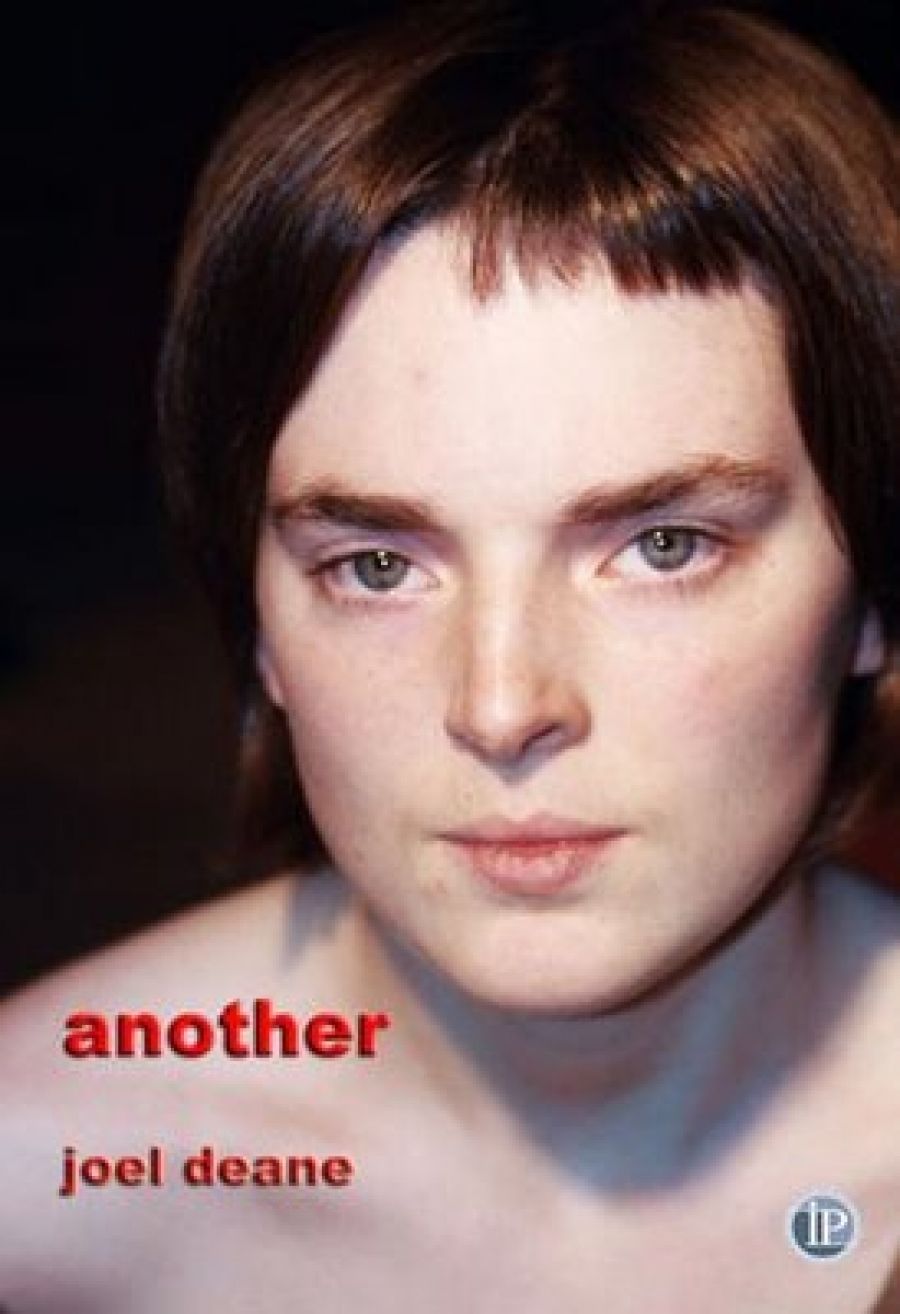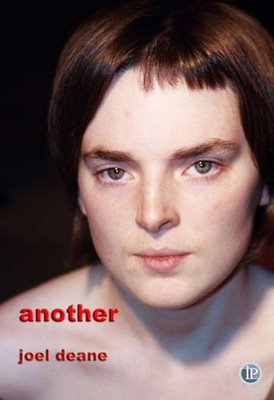
- Free Article: No
- Contents Category: Fiction
- Review Article: Yes
- Article Title: Who Jests at Scars?
- Online Only: No
- Custom Highlight Text:
These first novels by Joel Deane, the Victorian premier’s speechwriter, and Merle Thornton, a former academic who famously chained herself to a male-only bar in Brisbane, focus on radically different social groups. Deane’s Another is about two unemployed adolescents living in an outer Melbourne suburb bypassed by a freeway where the local McDonalds is the town’s nucleus. In After Moonlight, Thornton presents a bookstore-browsing, duck-eating, macchiato-sipping, Carltonish academic. (The novel is replete with such portmanteaux.) That both novels are set in the same city is a shock. Another commonality, more poignant, is a concern with the personal and the enduring effects of tragic pasts.
- Book 1 Title: Another
- Book 1 Biblio: Interactive Press, $27 pb, 214 pp
- Book 1 Cover Small (400 x 600):

- Book 1 Cover (800 x 1200):

- Book 2 Title: After Moonlight
- Book 2 Biblio: Interactive Press, $25 pb, 275pp
- Book 2 Cover Small (400 x 600):

- Book 2 Cover (800 x 1200):

Deane’s novel explores this theme relentlessly. Its characters are scarred, both visibly and invisibly: Toby, the main protagonist, suffered burns in a house fire lit by his father; Toby’s girlfriend, Suzie, cuts out the pieces of skin her father, a paedophile, touches. Interwoven with their stories are those of others, telling of intergenerational abuse and suffering. Deane shows the insidious links between pain and anger, pain and guilt, pain, and identity. The protagonists inflict harm on others and on themselves. Unable to escape the past, their present is a futureless limbo.
Deane portrays the entire community of Another, the novel’s eponymous setting, as stuck in the past, encroached upon by an alien future of suburban development. Another is a land of thongs, Monaros, paddocks, subdivisions, Pauline Hanson supporters and petty crime. Even the McDonalds drive-through has an old-fashioned fibreglass order box. This is, of course, an effect of endemic poverty (also linked to personal damage), and the novel’s mise en scène is insistently poor and ugly. Toby lives in a caravan behind the house where his long-suffering mother, his senile grandmother and his brother’s ex-girlfriend Michelle uneasily cohabit. Toby’s brother is in a vegetative state in hospital following a motorcycle accident; his mother is the only breadwinner. In one scene, the characters are watching television: ‘Michelle is smoking, chin sunk into her jowls, flicking the ash into a dirty coffee mug, watching the telly through blue mascara squint-holes. Roseanne lets rip with a one-liner about loose-meat sandwiches and the show chops into an ad-break, but Gran keeps staring at the screen.’ The characters change the channel with pliers before Toby smashes the television. There is skill here in arranging such a conglomeration of ugly images. But while this resembles Kath and Kim grotesquerie, it isn’t a joke. Michelle comes out with the Brandoesque ‘I could’ve been a hairdresser’, but her dreams and her inability to achieve them are tragedies.
The novel is filmic in its attention to detail and almost unremittingly bleak. However, despite the grotty realism, the narrative is interspersed with lyrical magical-realist moments. At times a narrator, in utero, contemplates the cosmic wonder of life in lines that reveal Deane’s double life as a poet: ‘I see this day dying … and find myself in love with [it] for no good reason.’ The unborn narrator also comments on Toby’s blindness to the future and the past, which includes, as well as his own family’s tragedies, crimes against Aborigines. Sometimes Toby does see the shadows of history that rise – like the undead, like sinister unreason – with the night. These interludes are reminiscent of those in Tim Winton’s Cloudstreet, which provides an interesting counterpoint. Deane’s novel represents a similar working-class demographic, but rejects Winton’s heady romanticisation.
Another isn’t pleasant, but nor is it entirely satisfying. There are amateurish moments (‘Toby trails a greasy hand through the dirty blonde hair that falls across his grey eyes’), and the promise of lyrical force is not quite realised. The interweaving stories, however, are nicely structured, and the plot is well paced. Deane’s achievement is to humanise people most Australians don’t believe in, or perhaps only see in television caricatures or in video footage of service-station robberies.
Thornton’s book is about another world, one in which broad Australian accents are commented upon. Its protagonist, Claire, is a pretty, thirty-something redhead who wears ‘well-cut slacks’ and is a part-time academic at Melbourne University. Claire shares a house with Gerda, who knits soft sculptures, and Bryce, a gay consultant. She also has an unhealthy obsession with her ex, a senior university lecturer, formerly her teacher. Roger is a stereotypically lazy academic but hard-working lecher, who is ironically writing a Foucauldian book on power operations in educational institutions. Claire teaches Hamlet and, behaving more like Hamlet than Ophelia, stalks Roger. She crashes his parties, makes prank calls and spies on him. Her actions are often comic, as are her tutorial exchanges with her students, which read like less offensive episodes of Mind Your Language.This is a lighter novel than Deane’s, but it too concerns the personal past and inescapable pain. The loss of Roger is not the problem (it may even come as a relief to the reader). The loss of Claire’s parents, who died in a car accident when she was a child, is the real issue. Claire’s brother is in an asylum, clinically depressed. Thornton’s novel, like Deane’s, also contemplates Aboriginal dispossession.
After Moonlight’s strengths are in characterisation and plot. Claire is engaging: impulsive, secretive, caring, and blunt. Her relations with her housemates are almost real: they’re chatty or grumpy; they’re sometimes selfish and other times supportive; they insult each other and eventually move on. They call each other best friends, but one gets the sense that they barely know each other. Claire’s stalking episodes are well staged for pathetic-comic effect, and her dutiful interactions with her institutionalised brother are affecting. However, some of the stream-of-consciousness devices, more prominent at the beginning, can make reading difficult, and passages of philosophising about power and story, and their relationship to subjectivity, are clumsy and stall the narrative.
After Moonlight is partly about the need for women to locate themselves outside patriarchal structures – quite a difficult task in a patriarchal society. This is something Claire, exploited by a corporatised university, attracted to powerful men, and wanting children, has to work through. Gerda, her housemate, who had a child after a one-night stand of ‘weakly consensual’ sex, is way ahead of her. When Claire asks about the absence of men at Gerda’s exhibition, ‘Matrilineal Images’, Gerda replies they’re ‘in the ambience. It’s not them I’m attending to.’
Thornton is a well-known feminist. Her novel contains the memorable line: ‘“Family values” is code for “make women slave for their male rellies”.’ Deane’s book, however, is more explicit about the sins of men. In addition, while After Moonlight features affairs and quotations from Shakespeare, Another seems to have more faith in love, its romance reminding me of that famous passage from Romeo and Juliet: ‘He jests at scars, that never felt a wound. / But, soft! what light through yonder window breaks? / It is the east, and Juliet is the sun.’ Deane’s language is different: the two scarred and wounded lovers ‘went halvies on a cask of wine at the bottle shop, found a dark patch of grass, squirted long slashes of wine into each other’s open mouths, kissed, fucked, fell into a dizzy sleep as the Earth revolved beneath them’. But the sentiment, that moment of grace, of reprieve, is the same.


Comments powered by CComment